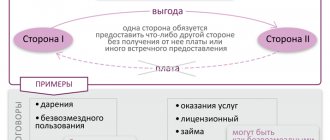The right of ownership of living space allows the owner or co-owner to dispose of real estate at his own discretion. The object may participate in sales, leases and other transactions provided for by law. However, the situation is complicated by the presence of rights to use real estate from third parties.
To protect yourself from potential cohabitants after purchasing an apartment, it is better for the buyer to find out in advance whether there are citizens entitled to use the property. Of course, any apartment owner has the right to live in it, but the list of people who can use the property often consists of more than just the homeowners.
Is it possible to conclude a DPA with the right of residence?
In accordance with Art. 421 of the Civil Code of the Russian Federation, citizens are free to enter into an agreement - any additional conditions can be included in it (it is only important that they do not contradict current legislation). Since granting the former owner the right of residence does not violate the law, this clause can be included in the DCP. Such a document belongs to the category of mixed ones, since it contains elements of different contracts (clause 3 of Article 421 of the Civil Code of the Russian Federation).
Typical mistakes when buying an apartment
- If the seller makes a transaction under a power of attorney, the other party should be careful in situations where the power of attorney has an expiration date of more than a year, or the representative of the authorized person is an elderly person or a very young person. It is necessary to study the power of attorney very carefully, also find the notary who executed it, and make sure that the document is valid and has not been revoked. Also, the buyer must meet with the issuer and talk to him. There are cases when powers of attorney were used from people who had already died or who refused to sell the apartment at all. It is best to ensure that the power of attorney is current.
- Please note that minor citizens, having reached the age of 18, have the right to apply to the court for 3 years after this event to have the transaction declared invalid. Take this into account when buying real estate, and in particular you need to carefully make sure that the rights of the child are not violated, all documents and permits from the authorities that carry out guardianship and trusteeship are in proper form.
Transaction procedure
If you have not found the answer to your question, then you can get an answer to your question by calling the numbers ⇓ Free legal consultation
If you need to conclude such an agreement, and you have found a buyer who agrees to your terms, you must go through certain stages of the agreement, listed below.
Stage 1. Agreeing on the terms of the contract
At this stage, the parties are required to discuss and agree on all the terms of the agreement. If possible, you need to draw up a preliminary version of the transaction. The seller and buyer can enter into an agreement only in a situation if they have discussed among themselves all the significant terms of such an agreement in accordance with the norms of the Civil Code of the Russian Federation.
The legislator considers the conditions regarding the price and subject of the contract to be significant . If the parties do not reach an agreement regarding these points, the transaction will be considered unconcluded. In addition, the legislator stipulates that, at the request of one of the parties, some terms of the contract may also be considered significant.
Stage 2. Signing the agreement and notarizing it
The next stage is the signing of the contract and its notarization. If the subject of the contract is rent, then this document, in accordance with the provisions of Art. 163 of the Civil Code of the Russian Federation and Federal Law dated July 13, 2015 No. 218-FZ must be certified by a notary office.
The notary also checks the legal capacity of the seller and buyer. In addition, he controls how much the parties understand the essence of the transaction and whether they understand all the requirements and the consequences of signing it.
An important condition is the legal capacity of the selling party. Often, swindlers take advantage of the insanity of an elderly person in order to take away the property that belongs to him. The notary's task is to carefully check the legality of the transaction. If the seller is considered incompetent, his guardian has the right to dispose of his property.
Stage 3. State registration of rights
The transfer of ownership rights must be registered with the relevant government body - Rosreestr or MFC. For registration, all the above papers must be submitted and additionally attached:
- passports;
- agreement (3 copies);
- statement;
- Application form for state registration of rights
- receipt for payment of the fee.
After state registration is completed, the new owner is given a document of ownership. According to the law, the transfer of rights to real estate occurs after its state registration. Moreover, the previous owner retains the opportunity to use the property for life. This right also remains in the event of a subsequent change of ownership.
If the contract for the sale of housing is not in writing, it is invalid (Article 550 of the Civil Code of the Russian Federation).
How to determine the procedure for using an apartment
As we already mentioned above in the article, the procedure for using donated real estate may delimit the conditions for using joint property. The main factors determining the procedure for use are the following conditions:
- A person who has donated an apartment under a deed of gift with the condition of lifelong residence of the donor has the right to use it until his death.
- The recipient can use only one part of this property (usually one room), and the right to dispose of the entire apartment passes to him after the death of the donor.
- Both parties to the transaction have the right to transfer their part of the property to another person, but this must be agreed upon in advance and included in the gift agreement when drawing it up.
- After the death of the donor, the apartment donated by him will be excluded from the inheritance mass and transferred to the donee, in accordance with the provisions of Article 292 of the Civil Code of the Russian Federation.
- When concluding a deed of gift with the legal indefinite residence of the donor, the parties may include in the agreement a condition for other persons to live with them in their part of the apartment.
All of the above and other conditions must be agreed upon by the parties before drawing up and signing the act. However, even in this case, it is difficult to guarantee 100% compliance with the terms by the other party to the transaction.
Met and got married
Alexey came on a business trip to Yekaterinburg from Moscow in 1997. By that time he was already married. From this marriage he had a beautiful daughter, whom he loved very much. But circumstances turned out that he and his wife divorced, so in Yekaterinburg he found himself a completely free man. One fine fine day he met Olga. A romance began between the young people, which ended in marriage.
Olga, without hesitation, moved to live with Alexey in Khimki Moscow Region. They lived well, amicably. But the relationship between Olga and Alexei’s daughter Anna did not work out at all. But Anna temporarily lived and worked in America, so such a difficult relationship between stepmother and stepdaughter did not particularly bother anyone.
Dependent housing policy: what is it?
Upon sale, the owner of the apartment reserves the right to reside in the alienated property.
Most often, such agreements are drawn up by elderly people in order to obtain an additional source of income and eliminate the risk of eviction from the apartment.
The document may provide for the buyer’s obligation to ensure the maintenance of the former owner of the apartment in the format of social care or monthly payments of a set amount.
The following points must be included in the text:
- Place of actual signing of the agreement and date.
- Personal data of the parties to the transaction.
- Subject of the transaction and its technical characteristics.
- Duration of the agreement.
- Rights and obligations of the parties to the transaction.
- Payment procedure and conditions for transferring the subject of the contract to the buyer.
- Conditions for the redemption of lifelong maintenance.
- Responsibility of participants for non-compliance with the terms of the transaction.
- Procedure and conditions for termination.
The DCP must be notarized. At the same time, the notary confirms not only the authenticity of the title documents, but also evaluates the seller’s legal capacity.
Article 421 of the Civil Code of the Russian Federation may be applied, according to which the seller and buyer have the right to independently determine any of its conditions, if they do not contradict the law. The inclusion in the DCT of a condition on the right of lifelong residence and use is permissible and does not contradict the legislation of the Russian Federation.
Legislative norms governing this type of transaction:
- Article 601 of the Civil Code of the Russian Federation “Agreement for lifelong maintenance with dependents.” It describes the terms of the transaction.
- Article 558 of the Civil Code of the Russian Federation “Peculiarities of the sale of residential premises.” Describes the essential terms of the contract and regulates the mandatory certification of the transaction by a notary.
- Article 450 of the Civil Code of the Russian Federation “Grounds for amendment and termination of the contract.” The conditions and procedure for terminating the agreement are described.
- Article 421 of the Civil Code of the Russian Federation “Freedom of contract”. According to this article, individuals and legal entities are free to enter into an agreement and may include in it any conditions that do not contradict the law.
- Article 217.1 of the Tax Code of the Russian Federation “Features of exemption from taxation of income from the sale of real estate.” Describes the conditions and necessity of paying income tax in relation to the parties to the transaction.
How to compose?
It can be compiled by hand, in simple written form. It must contain information about the owner, donee, and real estate. You should also indicate the rights and obligations of the party, specifically state the owner’s living conditions and the termination dates for certain clauses.
The last block must contain the signatures of the parties and the date of signing. Without these details, the contract will be considered invalid. In addition, all data must be entered accurately. Corrections and typos are not allowed. Handwriting must be legible.
If a notary is involved in the registration, then the responsibility for writing will lie with him. At the same time, clients will have an additional guarantee in case of loss of the document: they will be able to take a copy from the notary and not have to fill out the document again.
Who can qualify?
- Persons who refused a share in favor of one of their relatives at the time of privatization.
- Persons whose right of residence is established in accordance with the will.
- Husband or wife, if there is such a condition in the marriage contract.
- Member of the cooperative, subject to partial payment of the share.
- A minor living in a boarding school or in a correctional facility.
It is possible to sell an apartment with an encumbrance in the form of the right of lifelong residence without obtaining the consent of the owner.
Rights and obligations of the parties
As part of such an agreement, the donor transfers his rights to real estate to another person. The transfer must be free of charge. That is, the former owner does not receive any material compensation. But he retains the right to use the premises.
In turn, the recipient accepts the property and receives the right to dispose of it. But at the same time, he must ensure that the former owner can live in the premises.
In addition, the new owner is obliged to provide the resident with unhindered access to the apartment. That is, the former owner should be able to come and leave the apartment at any time convenient for him. Otherwise, there will be a breach of contractual obligations, which may lead to the cancellation of the transaction.
The recipient may subsequently even sell the apartment, but the former owner will still retain his right to reside. In fact, a transaction of this nature establishes an encumbrance on the apartment.
Peculiarities of the agreement if the object is sold with such an encumbrance
- The DPA of housing with the right of lifelong residence is required to be notarized. The notary must check not only the authenticity of the title documents, but also the legal capacity of the seller.
- According to Article 549 of the Civil Code of the Russian Federation, after registering the transaction in Rosreestr, the buyer must receive an extract from the Unified State Register of Real Estate with a note about the existing encumbrance on the living space in the form of a tenant.
- Ownership of the apartment passes to the buyer immediately after signing the agreement.
- After the conclusion of the agreement, only the buyer remains the obligated party, provided that data on lifelong maintenance and monthly payments were included in the contract.
- The validity of the document is urgent (obligations terminate after the death of the seller).
- After the alienation of the apartment in favor of the buyer, all responsibilities for the maintenance of the apartment are transferred to him - payment of taxes, repairs, maintenance of housing, payment of utilities, etc.
- A citizen living in an apartment on the basis of this agreement can register someone in the apartment that is the subject of the transaction only with the consent of the new owner of the property.
Procedure
- The parties discuss all the terms of the transaction, including the section regarding accommodation.
- A purchase and sale agreement is drawn up taking into account the agreements reached, the wishes and requirements of the parties.
- The agreement is certified by a notary and the document is subsequently registered.
- The buyer and seller sign the apartment acceptance certificate. At the same time, funds are transferred.
- The buyer registers ownership.
Depending on your region of residence, the last two points may be swapped. Thus, the buyer will first register ownership and only then will the final payment be made and receipt of the keys to the apartment.
Documentation
To conclude such an agreement, you need the same package of documents as for a regular purchase and sale. This is due to the fact that the clause on permanent residence usually does not require any documentary evidence. The exception is situations in which you really need to make sure that the seller who plans to continue to live in the apartment is truly competent. In this case, additional information will be required.
Sample list of documents:
- Passports of the parties.
- Registration certificate for the apartment.
- Extract from the Unified State Register of Real Estate.
- An extract from the house register about persons registered in the apartment.
- Certificate from the management company about the presence/absence of debt on utility bills.
Depending on the situation and agreements reached, other documents may be needed. For example, permission from the guardianship authorities or consent to a transaction from the spouse.
Expenses
Considering the need to notarize such an agreement, in addition to the cost of the apartment itself, the main expense item will be the services of a notary. Depending on many factors, you will have to pay 2 thousand rubles or more. In addition, when registering property rights, you will have to pay a state fee of 2,000 rubles for each new home owner.
Deadlines
The procedure of negotiations and discussion of conditions can take several hours/minutes or several months.
It is impossible to predict more precise dates here. If all agreements are reached, then you can draw up an agreement and have it certified by a notary in 1 day. It may take a few more days to register ownership. In practice, on average, one home purchase and sale transaction from the moment of finding a suitable property to the registration of ownership takes about 1-3 months.
The right of residence significantly complicates the contract and increases the number of possible risks. In fact, despite the fact that the new owner of the apartment is its full owner, he is obliged to pay a lot of attention to his tenant, otherwise the contract may be terminated. Experienced lawyers will explain at a free consultation what exactly you should pay attention to and what you need to take into account when concluding such contracts. They can also accompany the entire purchase and sale procedure, timely intervening in the process when necessary. This approach can significantly reduce risks.
Procedure for using real estate
The right of lifelong residence implies the former owner’s ability to remain in the apartment permanently. In addition, he can use not only a separate room, but also common areas - kitchen, bathroom, bathroom, hallway. This applies to household needs. This right only implies the use of the premises. The former owner will not be able to dispose of the property.
Reference! Donating an apartment does not relieve the tenant of his responsibilities. For example, he will have to bear the cost of paying for utilities.
Examples
- I am the owner of a residential property under a purchase and sale agreement with my father's lifetime occupancy. Interested in the following:
1) do I have the right, after I get married, to register my spouse in the apartment?
2) does he have the right to live in residential premises without my father’s consent?
3) what needs to be written down in this agreement so that my husband’s registration in this apartment and his residence is impossible, since my father is against it?
The owner of the property has the right to register anyone he wants, especially his husband. A clause in the contract that limits the owner’s rights to move in a spouse will be void.
- My aunt sold me an apartment. We entered into a purchase and sale agreement with her living in a residential building for life. I make payments for the apartment without delay. My aunt was admitted to the hospital, where she was diagnosed with cancer and will soon be discharged. The social service insists that I must look after her, or invite a nurse. But we hardly talk. I only pay for housing. What should I do? Am I obligated by law?
You must do only what is stated in the agreement, nothing more.
You should not have any obligation to care for your aunt under the purchase and sale agreement, since you did not enter into a rental agreement. The funds were given, and that was that. And it is unlikely that your relative will go to court. So make your own decision - whether you will help her or not.
There are many nuances that need to be taken into account when concluding transactions for the purchase and sale of real estate: each case is unique. Every little detail must be taken into account when signing a contract. It can be recommended to invite experienced specialists to both parties, since there are often cases of fraudulent schemes when a lawyer is involved in a transaction only on the seller’s side. When completing a transaction, an intentional error is introduced into the agreement, which allows, after receiving funds from the buyer, to delay the time, or even not complete the transfer of ownership of the home, and to drag the buyer into a long trial.
Advantages and disadvantages
There are pros and cons of such transactions for both one and the other party.
Benefits for the owner include:
- The right to live and use the apartment for the rest of your life free of charge.
- The right to maintain registration.
- The right to terminate the contract if the other party does not comply with the terms.
The main disadvantage is that the donee can use the property at his own discretion. Can sell, rent, or give the apartment to third parties.
The benefits for the recipient are:
- Receiving property free of charge.
- The right to full disposal of property.
- No need to provide and care for the owner.
The main disadvantage is that it is quite difficult to sell or rent out an apartment with a tenant.
A deed of gift with the right of lifelong residence can be beneficial and convenient in some cases. For example, if this is the owner’s only home. But before you make a deal, you need to weigh all the pros and cons.
Lifetime residence agreement:
The universal basis for their legal capacity is the corresponding type of obligation of the homeowner to the designated persons.
The owner is obliged to comply with these obligations by virtue of established standards or the provisions of legislation, including Article 558 of the Civil Code of the Russian Federation.
Reasons for refusal and solutions
The ban on entering into a transaction of this nature is established by Article 575 of the Civil Code of the Russian Federation. You cannot donate property in the following cases:
- on behalf of minors and incompetents;
- employees of educational, medical institutions, organizations providing social services, including for orphans and children without parental care, citizens receiving treatment, maintenance or upbringing there, spouses and relatives of such persons;
- persons holding state and municipal positions;
- in relations between commercial organizations.
The transaction will be considered void if the contract states that the donor receives material remuneration or a service. To overcome obstacles it is necessary to eliminate them. For example, recognizing a person as legally competent through a court.
Lifetime residence agreement with dependents
This legal precedent differs in that the transfer of property rights to real estate is carried out free of charge on the basis of Article 601 of the Civil Code of the Russian Federation.
The purchaser of real estate, which becomes property directly after registration, is not required to make monthly payments of specified amounts.
As a rule, the clauses of the document provide for the care of the former owner and support for his life support at the level established by the counterparties.
The main services provided include:
- provision of food;
- purchase of medicines;
- cleaning the premises;
- carrying out repairs, replacing plumbing, etc.
All agreed services provided to the dependent are paid from the personal funds of the new apartment owner. As a rule, these services are provided for life, and after death it is possible to provide for the conditions for burial and holding memorial dinners at appropriate times.
For persons requiring medical care, inclusion in the list of relevant requirements is acceptable. The indicated conditions are considered by the parties and recorded in detail in a list attached to the agreement.
If they are not fulfilled by the successor of the property, the agreement allows for termination both on special (Article 599 of the Civil Code of the Russian Federation) and on general (Article 450 of the Civil Code of the Russian Federation) grounds, in the manner of judicial proceedings. However, all demands made by the dependent must be proportionate.
The encumbrance of real estate by a dependent does not become an obstacle to renting out the premises or selling them. An apartment or private house can also be used as collateral. At the same time, the owner will need permission to conduct a property transaction or transfer of housing as collateral from the previous owner or a corresponding decision from the guardianship and trusteeship authorities.
To avoid claims to real estate by the dependent's relatives, the successor should collect all receipts for payment for services and purchases intended for the ward. And care, cleaning or medical procedures must be recorded in a journal, with the certification signature of the recipient of the services.
Rent
Under a rent agreement, one party (rent recipient) transfers ownership of property to the other party (rent payer), and the rent payer undertakes, in exchange for the received property, to periodically pay rent to the recipient in the form of a certain amount of money or the provision of funds for its maintenance in another form.
clause 1 art. 583 Civil Code of the Russian Federation
There are three rental options:
- permanent annuity;
- life annuity:
- lifelong maintenance with living (PSI).
Rent is a burden. When the encumbered property is alienated, the payer's obligations pass to the new owner. Rent agreements are subject to notarization, and when transferring real estate, also state registration. The transferred property is pledged to the recipient. The payer is obliged to ensure the fulfillment of his obligations in any way provided for by the Civil Code (penalty, guarantee, etc.) or to insure the risk of liability for non-fulfillment. In relation to the topic under consideration, life annuity and PSI are of interest.
Under a lifetime annuity agreement, the payer regularly makes lifetime cash payments to the recipient or a person specified by him in an agreed amount. When transferring property to the payer free of charge, the amount of the monthly payment cannot be lower than the subsistence level. Payments can be made in favor of several persons in equal shares. After the death of one of the beneficiaries, his share is distributed among the others. Property can be transferred for a fee. For late payments, interest is paid based on the Central Bank rate.
In the event of improper fulfillment of obligations by the payer, if such violations are of a significant nature, the recipient has the right to:
- demand the redemption of the rent at the price established by the contract, and if the price is not established - in the amount of the annual rent in the case of a paid transfer of property to the payer and in the amount of the annual rent plus the cost of the property in the case of a gratuitous transfer;
- demand termination of the contract and compensation for losses.
The responsibilities of the annuity payer for lifelong dependent maintenance may include caring for those in need
PSI has the following main differences from life annuity:
- the transferred property is only housing and other real estate;
- the payer’s responsibilities may include meeting the recipient’s needs for housing, food, clothing, as well as care if needed and payment for funeral services, and with the free transfer of property, the cost of monthly maintenance is set at two subsistence minimums;
- By agreement of the parties, in-kind support may be replaced by cash payments.
Disadvantages and advantages follow from the content of transactions. Unlike living gifts, annuities and IPAs are intended to provide financial support to recipients in exchange for property. If the owner’s goal is to receive systematic assistance, for ethical reasons it is not necessary to formalize the relationship in the form of a living gift. The deterioration of intra-family relations and the non-participation of the recipient in providing for the donors are the reasons for numerous lawsuits.
From my experience in the field of social protection, I can share some observations and conclusions. Quite often, grandmothers or elderly parents verbally agree with children/grandchildren living together or nearby, and other relatives about at least periodic feasible assistance in exchange for a gift. The donation is often made bypassing the primary or immediate heirs. As a result, assistance is not provided, and the donor finds himself in a defenseless position.
At best, an elderly person has no opportunity to either return property or receive support. In the worst case, the situation is aggravated by constant quarrels and conflicts with the recipient. Donors regularly try to invalidate gift agreements to relatives, citing misconceptions about the subject of the transaction, poor health at the time of conclusion, etc., but the courts usually refuse such claims (for example, the decision of the Sretensky District Court dated August 24, 2017 in case no. 2–355/2017).
If there is other property suitable for transfer to the payer (including more than just housing), a lifetime annuity will be preferable for both parties. Rent in cash allows you to eliminate or minimize communication between the parties to the transaction, which will significantly reduce the risk of interpersonal conflicts. The fact of regular transfer of funds is easily confirmed and refuted.
The best option for elderly homeowners in need of financial assistance and physical care is PSI living in transferred housing. In PSI contracts, the payer appears less protected. To protect his rights, the payer must confirm all payments and purchases in favor of the recipient. The absence of evidence of expenses incurred is regarded by the courts as their absence, which is clearly a significant violation of obligations. The vagueness of the term “care” allows it to be interpreted in the broadest sense, from delivering food to your home to maintaining a garden. If a conflict arises between the parties to the transaction, the payer risks being left without the property received under rent and the funds spent on the recipient, not counting labor costs and time (for example, the Decision of the Sinarsky District Court of Kamensk-Uralsky dated August 21, 2017 in case No. 2-491/2017 ). At the same time, cases of outright abuse are not uncommon. After the transaction is completed, unscrupulous payers disappear in the hope that the recipient will not go to court or will soon die (typically the Decision of the Sukholozhsky City Court of August 21, 2017 in case No. 2-677/2017).
Video: rent
Gift deed with lifelong residence
The donation procedure is a unilateral civil transaction. Despite the provisions of Article 572 of the Civil Code of the Russian Federation, which does not allow counterclaims from the donor to the donee, the parties have the right to include certain conditions in the contract.
One of these conditions is the transfer of an apartment or private house as a gift, but while retaining the right of use by the previous owner.
The condition is prescribed by a separate provision in the clause on the subject of the agreement, immediately following the recording of the gratuitous transfer of rights to real estate. It is advisable to formalize these civil transactions in a notary office, on a standard form. Notarization provides the parties with additional guarantees.
For example, the condition of the donor’s lifelong residence cannot be challenged by the successor, who, after an appropriate period of time, may consider the donor’s presence on the territory of the apartment to be burdensome (see Termination of a lifelong maintenance agreement).
The same applies to the donee, who has additional guarantees of the legal capacity of the gift. A notarized deed of gift is not subject to challenge by the donor or his relatives applying for inheritance.
The legal capacity of the transaction must be legally correct and not raise doubts among third parties, knowingly stopping their encroachments on the established civil relations of the parties.
When drawing up such agreements, it should be borne in mind that the transfer of rights requires not only legal registration, but also the actual transfer of powers to the new owner. Otherwise, the transaction may fall into the category of voidable or void, with ensuing legal consequences in the form of restitution. The transaction will become imaginary if there are no changes in property management.
A transaction will be considered a sham if the court recognizes that, under the guise of a gift, a type of transfer of real estate was carried out, which is permissible only by transfer under a will.
Upon completion of the transaction, the donor continues to freely use the apartment, but is not authorized to be responsible for making utility payments.
Payment for housing and communal services and rent becomes the responsibility of the owner; options for joint liability for the provision of payments are considered by the parties independently and are not included in the provisions of the deed of gift.
The successor has no right to petition for the eviction or deregistration of the donor. In case of dishonesty, there are additional grounds for termination of the transaction.
The real estate allows participation in the transaction, but the donor's right to use the premises continues to be preserved. Tenants can also move into the apartment, leaving a designated part of the living space to the donor.
Mixed gift
A deed of mixed type is concluded if the owner wishes to dispose of the property on an equal basis with the donee for the rest of his life. Thus, the latter undertakes the obligation not to interfere with the use of the apartment by the donor and not to prevent him from living in the living space without a time limit.
Lifetime annuity agreement
Rent relations are formed under the terms of Article 596 and other articles of the Civil Code of the Russian Federation. They are drawn up in an agreement that requires mandatory registration with Rosreestr. In relation to real estate, an annuity with lifelong maintenance is used.
These provisions provide for appropriate payments by the annuitant to the former owner. Payments continue throughout the survival period, or until the cost of the apartment or private house is paid.
Regardless of whether the cost of the property has been paid, the former owner continues to occupy the premises in accordance with the provisions of the contract, as determined by Article 605 of the Civil Code of the Russian Federation.
After execution and registration of the contract, the property becomes at the disposal of the rentee. Participation of the object in property transactions is allowed, provided that:
- the payments presented;
- parts of the premises to the rentee.
When transferring ownership to third parties, including legal entities, the rights of the rentee are retained. That is, the acquirer bears subsidiary liability for encumbering the property with rent, based on Article 586 of the Civil Code of the Russian Federation.
The destruction of the object is at the risk of the rent payer. He has the right to terminate the established relationship due to the lack of lost premises on the basis of Articles 595, 600 of the Civil Code of the Russian Federation. Such a decision is made in court, where the fate of the rent recipient is decided.
With use and ownership
The contents of the deed of gift indicate that the donating party has a lifelong right to use the apartment donated by him, and after death, his ownership right will pass to the donee.
What documents are needed to draw up a deed of gift with lifelong residence of the donor in 2021 with a notary
If you decide to protect your risks and conduct a gift transaction with a notary, you will need to provide him with the following documents:
- Original passports of both parties to the transaction;
- birth certificate (only in cases where the donee is a minor citizen);
- title documents confirming the legality of the donor’s desire to donate the apartment (for example, a certificate of state registration of ownership of the property);
- a document indicating the absence or presence of people registered in this living space (for example, an extract from the house register);
- certificate from the Federal Tax Service about the absence of debt;
- technical documentation indicating the actual price of the donated object and its characteristics, as well as a cadastral passport (required!);
- written consent of the spouse to enter into this transaction;
- a certificate from the Unified State Register or a similar extract from the housing management office, which is proof of the legality of the donor’s ownership of this living space.
In addition, in cases where a minor is present in the role of the donee in the transaction, you will need written permission to conclude a deed of gift from employees of the guardianship and trusteeship authorities.
The agreement must be executed in the presence of the donor and the donee. If for some reason one of the parties cannot be present, the absent person can be replaced by a proxy, provided that he has the appropriate notarized power of attorney.
What rights and responsibilities does the donor of an apartment have?
In addition, an obligatory part of drawing up a deed of gift of the type in question is to indicate in the contents of the gift agreement that the donor, after completing the transaction, has the right to live in the donated apartment indefinitely. This option is safer than the right to use real estate, since the use of donated living space does not determine the list of powers and the fact of living in the apartment.
The provisions of the Family Code of the Russian Federation provide very specific formulations of the obligations of a capable relative during the period of maintenance of incapacitated and disabled relatives. At the same time, these conditions apply not only to those who are included in the category of close relatives, but also to others - aunt, uncle, grandmother or grandfather.
Experienced lawyers recommend doing the following: during the period of drawing up and registering the deed of gift, make sure to include in the contract a condition for indefinite residence in the donated apartment with its actual transfer to the donee only after death or at the request of the current owner. As you can see, such a transaction is very similar to the preliminary gift agreement, which we told you about in the last article.
In any case, according to the legislation in force in Russia in 2021, the donor does not have the right to evict if he does not have other real estate with adequate conditions for normal living.
If the owner of the living space, after donating it, decided not to live in the apartment himself, which in no case contradicts the law, this must be urgently included in the terms of the contract, specifying the exact number of cohabitants, as well as the terms and conditions of their residence in this area.
Remember that the person who donated the property has the legal right to live there without paying any money (that is, completely free of charge), which must also be fixed in the contract.
In addition, today there is the concept of a gratuitous and repayable gift, which is worth making a note about in the deed of gift when drawing it up. In the second case, the recipient party assumes the obligation to make regular payments to the donor himself or for rent. In the first case, the property is transferred free of charge with all rights and obligations.
Also, the current owner of the property has the legal right to donate it to a citizen who pays rent, who has taken upon himself the responsibility of paying the full amount to the donor himself. At the same time, the latter can cancel the gift agreement in case of violation of obligations by the donee, without informing him of the decision made.
Thus, the best option would be to retain the direct ability to manage and use your real estate for the rest of your life, confirming this right with appropriate documentation.
Persons who have retained these powers can protect their property both from strangers and from other owners (in our case, the donee), who received their status as a result of drawing up a deed of gift for an apartment with the donor’s lifetime residence.
Do I need to pay personal income tax?
Receiving a gift is a material benefit for the recipient. According to tax legislation, he has an obligation to pay personal income tax on such income in the amount of 13% of the cadastral value of the residential property.
Find out more
An exception is the case of donating property in favor of close relatives. In this case, they are exempt from taxation. The circle of close relatives is established by the Family Code in Article 14.
Arbitrage practice
The courts allow the possibility of registering a DD with residence for an indefinite period, and this is confirmed by several appellate rulings:
- Determination of the Moscow City Court dated January 12, 2021 N 33-1137/17;
- Determination of the Moscow Court in case No. 33-14690/2015;
- Ruling of the Kurgan Regional Court dated April 28, 2016 in case No. 33-1487/2016.
The courts cancel the DD if, instead of the right to reside in the living space, the donor establishes a condition for receiving monthly maintenance - such agreements are recognized as rent and not as a gift.









